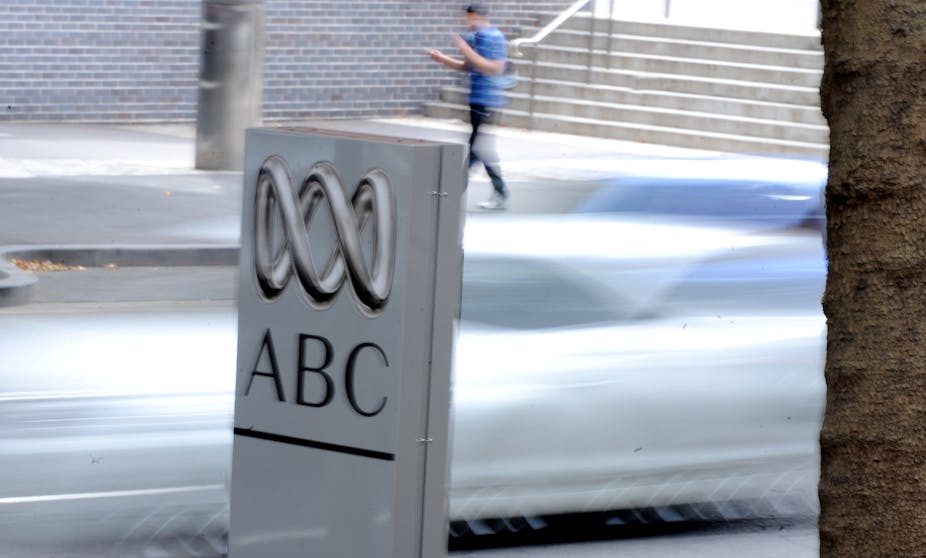The first public performance by the new ABC chair Jim Spigelman, rehearsed at the RIPE2012 conference on Wednesday morning , and reprised in a Tony Jones interview on Lateline on Wednesday night, opens some interesting questions for the future direction of the broadcaster – or in the new digital world, for one of Australia’s two public service media.
His appointment occurs in a context where two government inquiries – on convergence (Boreham) and on regulation (Finkelstein) – have offered totally opposed future pathways in terms of the responsibility of media companies.
A history of public service
Spigelman’s first incarnation in public service after his time as with Gough Whitlam was as head of Minister Moss Cass’s Department of Media.
It was the attempt by Cass to establish a regulatory framework for media content in relation to the press that produced the reaction of the press barons, the industry-created Australian Press Council. The APC is currently once more the subject of much contention.
The Finkelstein review has many characteristics of the 1970s debate, but with much water under the bridge since then, and of course, the explosion in the parameters of possibility following digitisation. Finkelstein tends towards statutory compulsion in the face of industry recalcitrance. The press companies (or what is left of them) display almost the same attitudes today that made them such pleasant partners in building social responsibility regimes 40 years ago.
The Convergence Review seeks to sweep up all publishers of any significance in whatever digital realm under a singular regulatory regime. Spigelman was adamant that the ABC for one would not be putting itself in that space. The ABC, he asserted, was very different to the commercial world; the ABC was subject to Freedom of Information legislation, had a transparent and arms length appointment process for board members, was guaranteed independence from the government, and (after the first Gulf War and at Hawke’s insistence) a formal internal complaints system (used extensively by Howard Government communication minister Alston after the 2003 Iraq war).
The ABC Charter
In making this claim Spigelman referred to the ABC Charter and its crucial role in framing the service and value that the organisation was expected to provide to all Australians.
He did not however refer to the content of the charter about which I am concerned. Nor indeed did Tony Jones raise these critical phrases in his interrogation of his boss (being more concerned to see if he could get Spigelman to diss on Sir Anthony Mason for his advice to Governor-General Kerr to sack Whitlam).
Charter 1(a)i requires that the ABC “contribute to a sense of national identity … [and] reflect the cultural diversity of the Australian community”. Whatever else it does, the ABC is also instructed by the Parliament “to take account of the multicultural character of the Australian community” (2(a)iv).
Diversity
In his latest book “Don’t go back to where you came from: why multiculturalism works”, Tim Soutphommasane quotes Age columnist Daniel Burt, who wrote of the media mirror of Australia as “one of those square metal sheets that they put above the sink in public toilets …”, producing a distorted, barely recognisable and ugly reflection.
While the ABC mirror may have been polished up with someone’s sleeve, no citizen of today’s multicultural Australia would recognise their country in the regular portrayals of the nation broadcast in 2011 in the 8 billion person hours of content (audience by time consumed across all platforms).
Now it could be argued that this is nit-picking, and that the second public service media organisation, SBS, actually does what the ABC’s Charter requires, and it’s just that no one got around to removing the offending words from the ABC charter. Think about that for a moment, the federal parliament removing the multicultural goals from the charter? Even John Howard would have been fazed by that challenge.
A national broadcaster
The senior national broadcaster has many roles, including disaster communication. RIPE2012 presenter Toshiyuki Sato from Japan’s public broadcaster NHK demonstrated that within one second of the tsunami/earthquake warning being received at NHK headquarters last year, multilingual warning announcements were appearing on Japanese television screens in English, Portuguese (Brazilian), Chinese and Vietnamese.
The ABC is appears has no multilingual strategy for disaster communication, apart from some valuable initiatives under development through radio with Indigenous communities exposed to cyclones in Northern Australia.
The ABC Board has been renowned under governments of all persuasions, Labor, Coalition or hung, for being an ethnically-cleansed zone. As far as I have been able to discover, there has never been a non-European Australian on the Board; Spigelman seems to be the first non-Australian-born board member (apart from the UK) for the past 30 years.
He brings with him a cosmopolitan awareness of the world and its diversity, and a critically sharp intellect. Perhaps he might introduce the ABC to the same global sensibility and capacity for self-awareness and change, and have them read the charter.

